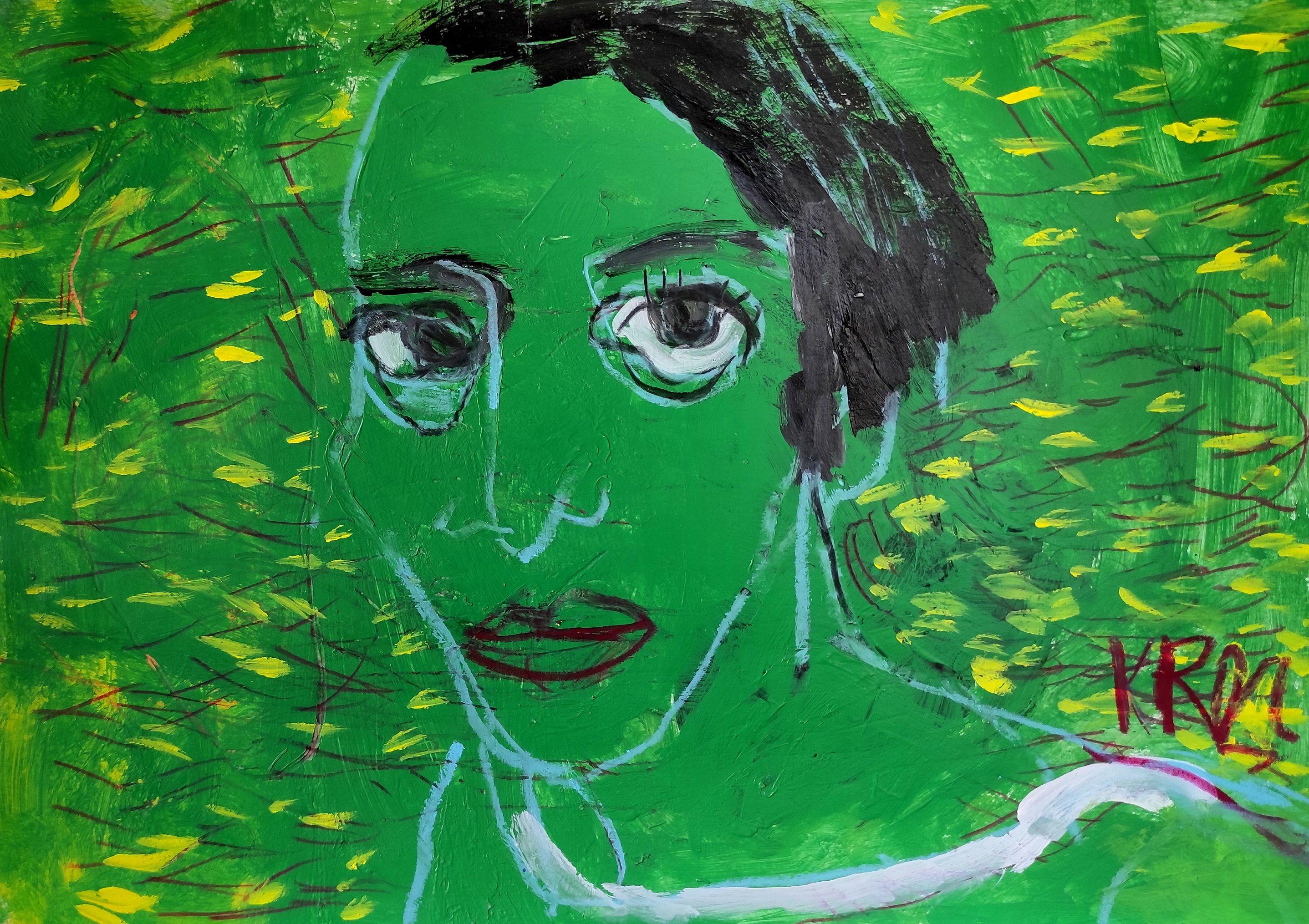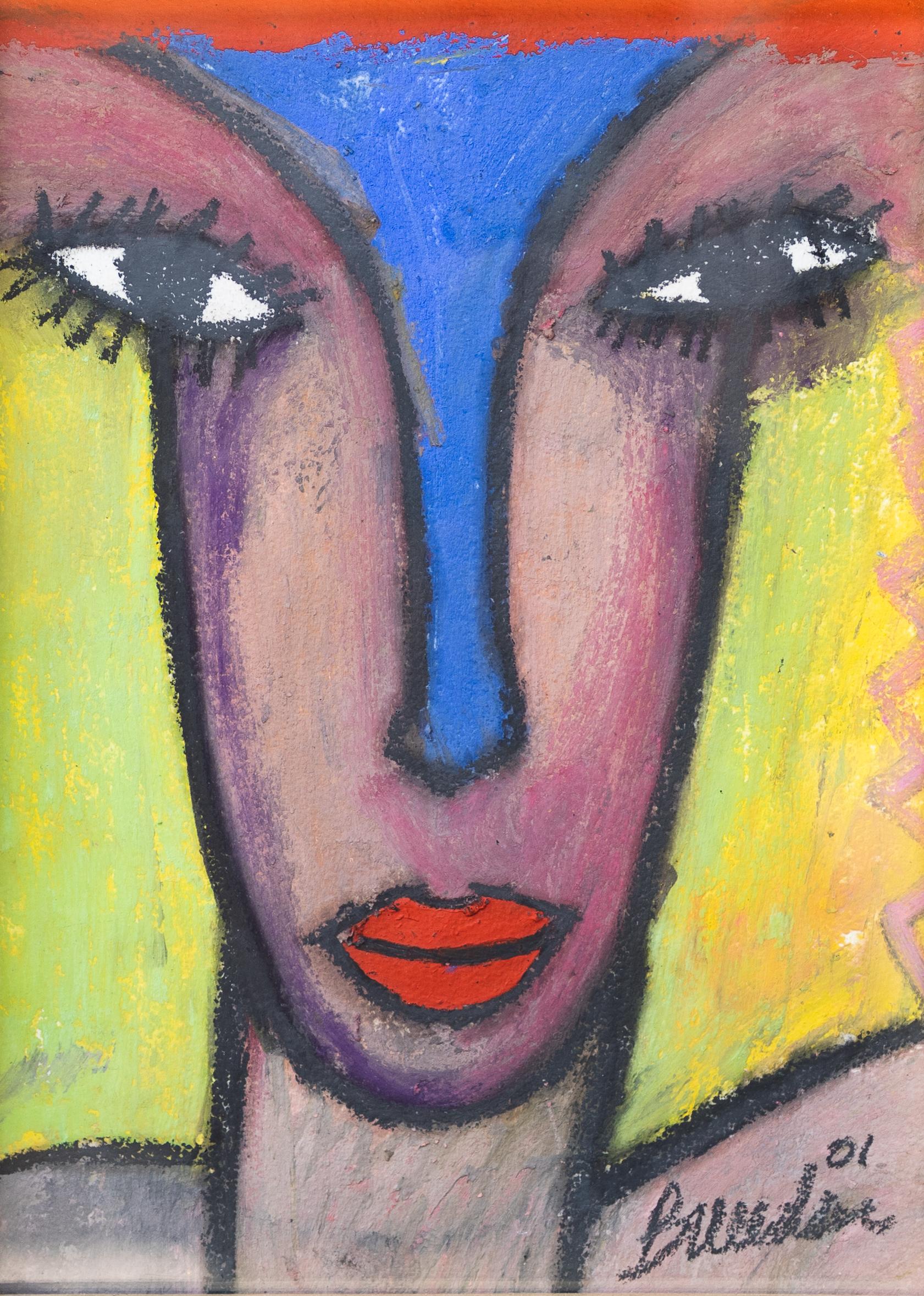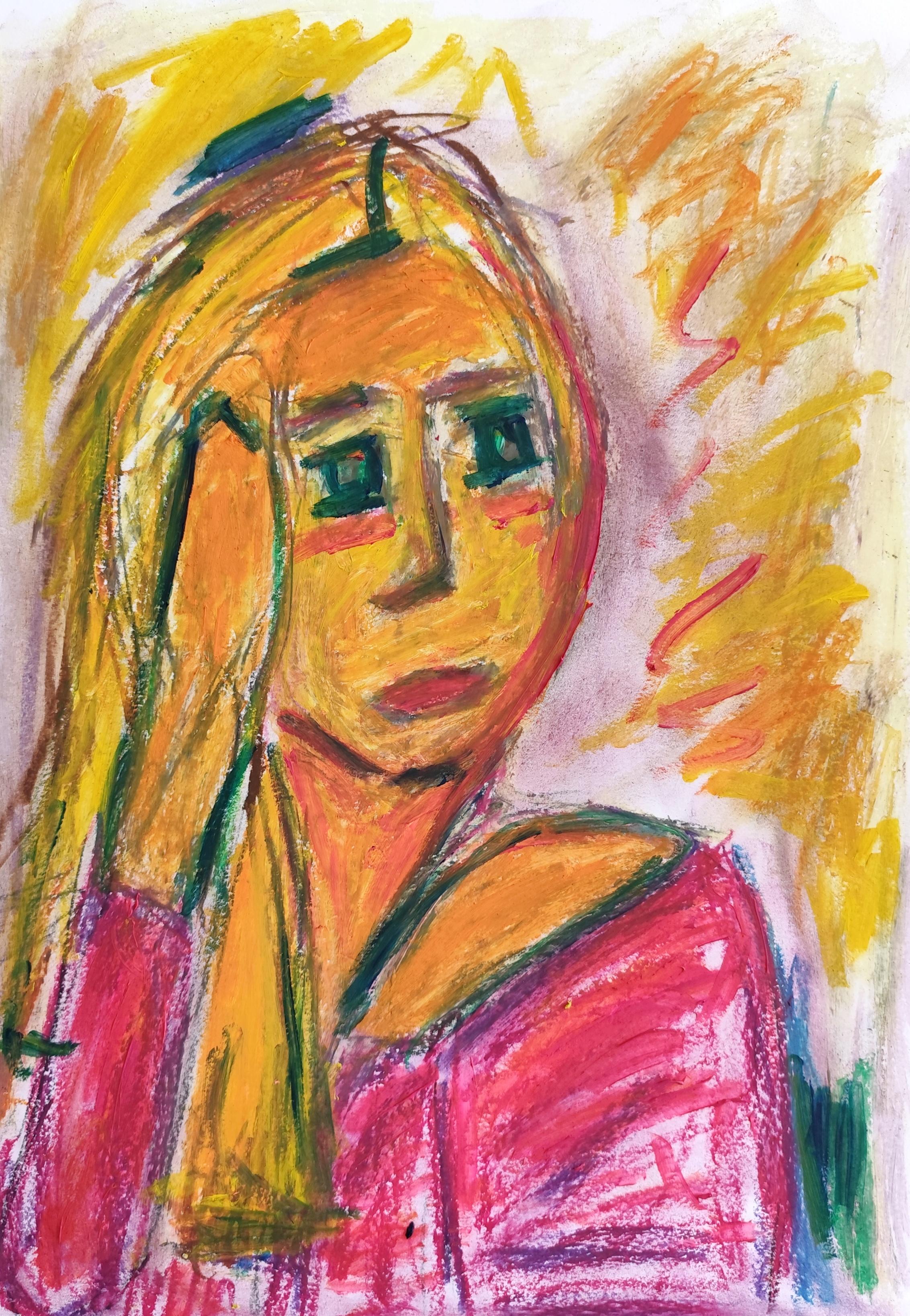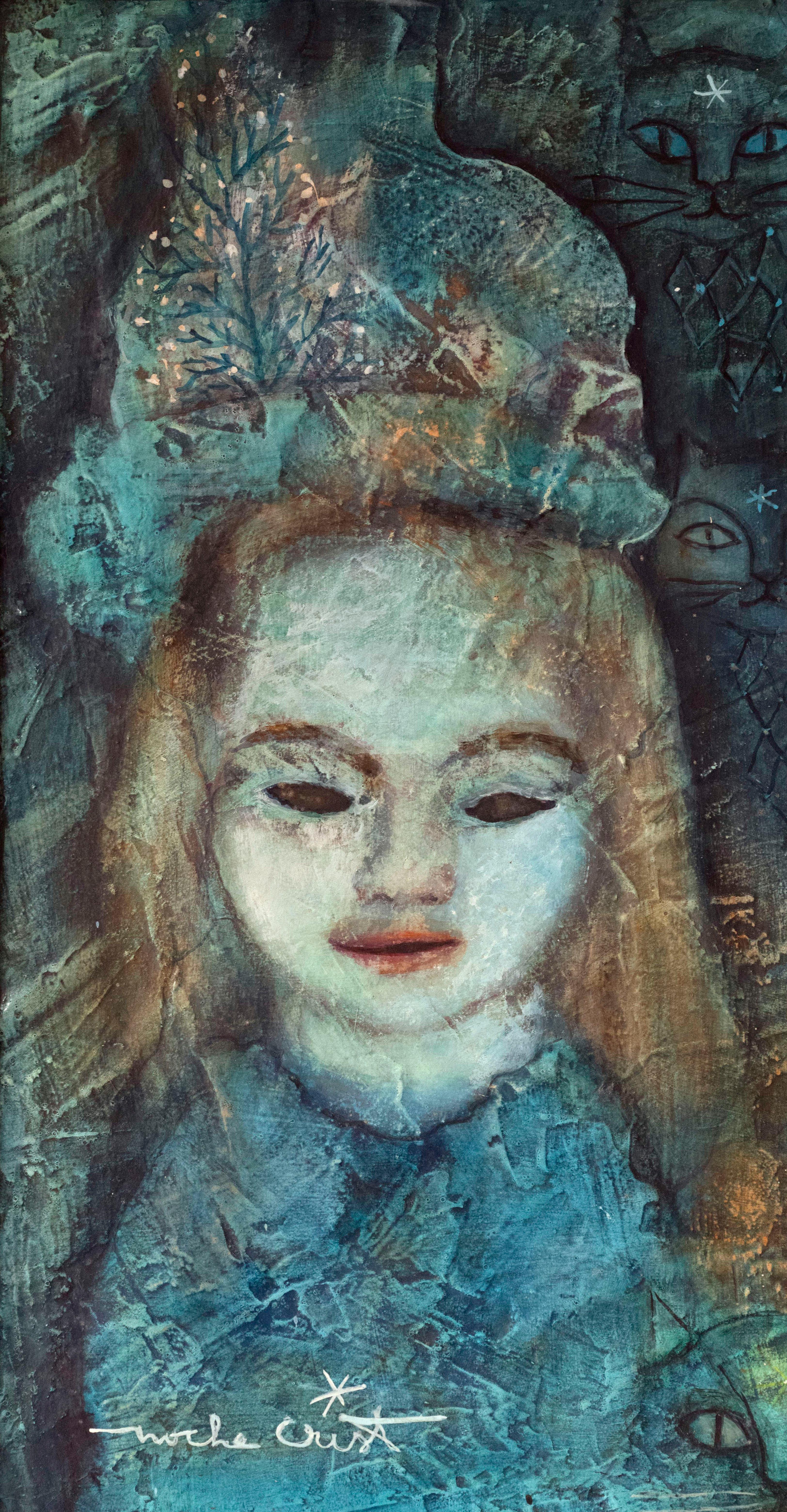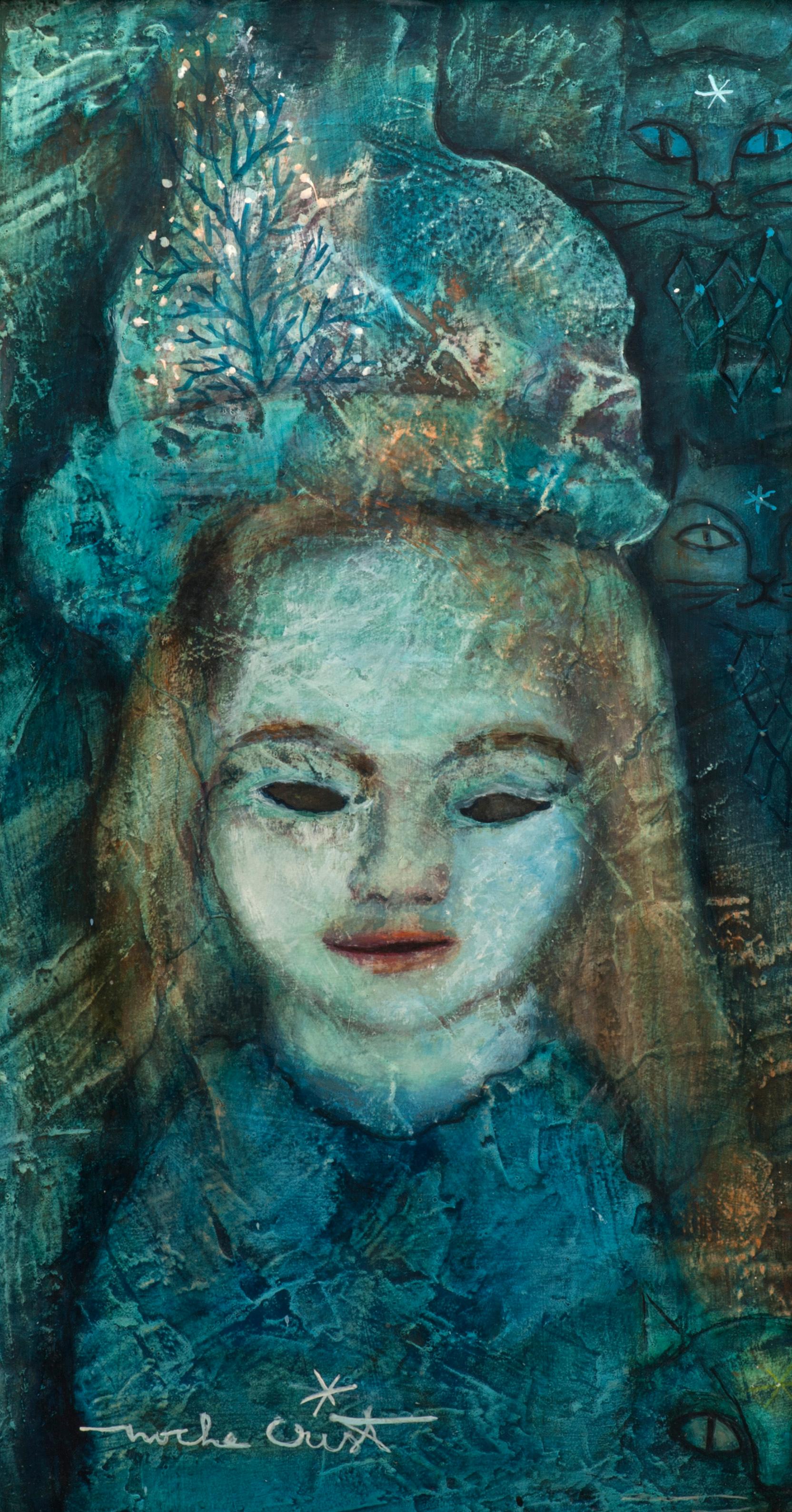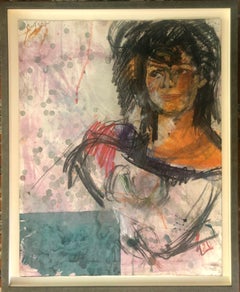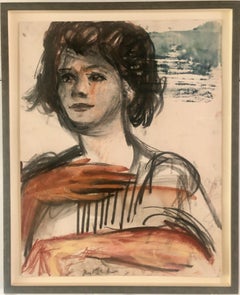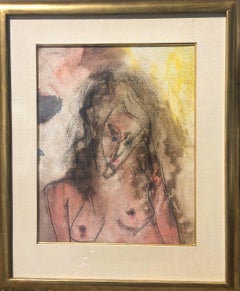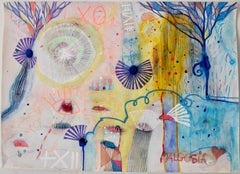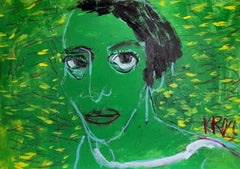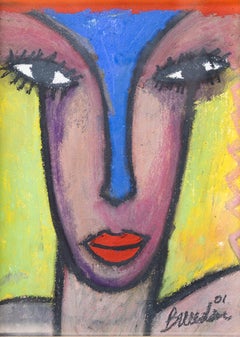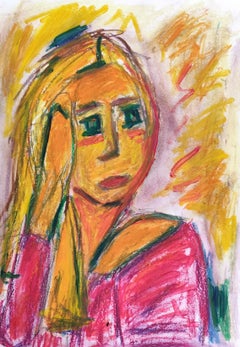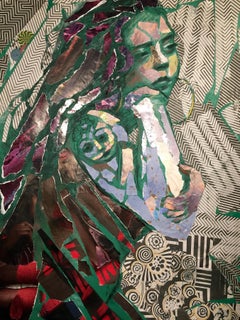Items Similar to Girl With Green Eyes Mixed Media on paper
Want more images or videos?
Request additional images or videos from the seller
1 of 5
UnknownGirl With Green Eyes Mixed Media on paper1980
1980
$270
£204.38
€234.42
CA$379.51
A$417.65
CHF 219.01
MX$5,068.60
NOK 2,737.61
SEK 2,591.76
DKK 1,750.08
About the Item
Girl with green eyes.
Portrait mixed media, watercolor, collage, pencil on paper, signed ZaZa New York about 1980s
- Creation Year:1980
- Dimensions:Height: 23 in (58.42 cm)Width: 19 in (48.26 cm)Depth: 5 in (12.7 cm)
- Medium:
- Movement & Style:
- Period:
- Condition:
- Gallery Location:Lake Worth Beach, FL
- Reference Number:1stDibs: LU19225543852
About the Seller
5.0
Gold Seller
Premium sellers maintaining a 4.3+ rating and 24-hour response times
Established in 2004
1stDibs seller since 2015
330 sales on 1stDibs
Typical response time: 3 hours
- ShippingRetrieving quote...Shipping from: Lake Worth Beach, FL
- Return Policy
Authenticity Guarantee
In the unlikely event there’s an issue with an item’s authenticity, contact us within 1 year for a full refund. DetailsMoney-Back Guarantee
If your item is not as described, is damaged in transit, or does not arrive, contact us within 7 days for a full refund. Details24-Hour Cancellation
You have a 24-hour grace period in which to reconsider your purchase, with no questions asked.Vetted Professional Sellers
Our world-class sellers must adhere to strict standards for service and quality, maintaining the integrity of our listings.Price-Match Guarantee
If you find that a seller listed the same item for a lower price elsewhere, we’ll match it.Trusted Global Delivery
Our best-in-class carrier network provides specialized shipping options worldwide, including custom delivery.More From This Seller
View AllPortrait of A Young Woman Work On Paper
By Alexander Rutsch
Located in Lake Worth Beach, FL
Young Model II Expressionist Portrait
Rutsch is always "scribbling and scrabbling." He is an artist of the purest breed—an artist who has no choice but to paint. He is a chosen traveler of the depths of existence; a man who follows a longing to explore his inner self and relate his findings with the energy and identity of the universe.
The celebrated Austrian artist approaches painting and sculpture as he lives life—with the eyes of a child and the hand of a poet. Constantly in the quest for rhythms of form and vibrations of color, he catches those "sparks in the shadow" and evidences their fullest reality and beauty in his creations.
Each of his paintings is a careful construction as it is a spontaneous act of love. While he might attribute certain artistic expressions to "coincidence," his inspiration comes from such diverse sources as: memories, dreams, sounds, numbers, telephone poles and drift wood. Rutsch has an affinity to vibrant colors, strong contours and rich brush strokes which are apparent in his oils, mixed media works and ink drawings. He has a sensitivity to the unusual, the discarded and a fondness for the ugly as well as the chaotic. These, he often transforms into poignant welded steel abstractions.
Rutsch has an aversion to politics, citing dates and expounding upon honors achieved. There is no talk about 'profound symbolism' in his work and as Carlo McCormick writes in the introduction to Rutsch's monograph, "Meaning is not a seed that Rutsch plants, nurtures and then harvests. It is what grows wild in a volcanic swamp of fossilized, decaying and new-born fancies—as an afterthought and aftershock." Alexander Rutsch is not concerned with interpretations; he is, however, passionate about the process of making art and surrenders his entire being as an instrument to the act of creation.
The geometry of his imagination overflows with figures, profiles and penetrating strong eyes—windows to a deeper place. Their vitality and sensuality pulsate through the "dreamscapes" of Rutsch's created worlds. At times romantic, yet always wild with energy, human forms and experiences are essential to the artist's vocabulary.
The son of opera singers and a singer himself, Rutsch speaks of "the art of painting as the art of silence" and the job of the painter "to dedicate himself to the silence." He adds though, "that this silence is the greatest existing sound in the universe." One wonders why then, if painting is "the art of silence," that Rutsch's paintings scream with sound. Sometimes melancholy, sometimes sensual, sometimes dissonant and sometimes whispering, the rhythms are always rich in the celebration of life and our shared humanity.
Painter, sculptor and poet, Rutsch's oeuvre over the past four decades is tremendous. Celebrated and collected especially in Vienna, Paris, Brussels and New York, he studied with renowned teachers like Boeckl and Dorowsky and collaborated with such geniuses as Salvador Dali. Having left Vienna in the fifties, Rutsch moved to Paris and took the city's art scene by storm. There, Picasso was so enthralled with a portrait Rutsch has done of him that, in a state of great excitement, he countersigned it.
Biography
Alexander Rutsch was born in Russia in 1916 but raised in Belgrade, Yugoslavia. After studying voice in Austria he became an opera singer like his parents, but after WWII, Rutsch's love for visual expression propelled him to change careers. He was a painter, sculptor, philosopher, musician, singer and poet. His life as a romantic is reflected in his work, as he sought to perfect his soul and humanity, "I paint my dreams," said Rutsch.
"My dreams are color and life. They soar in my head like millions of symphonies. I can never stop building dreams."
In 1952, after studying under Josef Dobrowsky, Josef Hoffmann and Herbert Boeckl at the Vienna Academy of Fine Arts, Alexander Rutsch received a scholarship to study in France. There he made contacts and began collaborations with his contemporaries, Picasso and Dali. Rutsch said of his experiences with Picasso, "Picasso played a short but important moment in my life in Paris that affected my entire artistic future. I learned from him that it is not important if art is not aesthetically finished. It can be raw, uncooked, rough. If an artist feels he has said it—it is not important to polish or finish it. Because of Picasso, I learned that if I don't feel the need to finish—I don't have to." In 1954 he exhibited his work at the Salon Artistique International de Saceux and won first prize for abstract painting, the first of may awards received during his prolific career.
During the 13 years he lived in Paris, Rutsch exhibited in many prominent galleries there and throughout Europe. In 1958, The City of Paris awarded him the prestigious Arts, Science and Letters Silver Medal. In 1966, Jean Desvilles presented his prize winning film "Le Monde de Rutsch" at the Cannes Film Festival and the Venice Biennial. In 1968 Rutsch moved to Pelham, New York where he continued to work in his studio and exhibit in galleries and museums worldwide.
Rutsch's work, as seen through his mastery of many art forms—sculpture, painting, print-making, and drawing, and a wide variety of other media has been described as "vibrating showers of lines, bold geometries, wounded anatomically rambling scrap-wood skeletons...
Category
1980s Expressionist Mixed Media
Materials
Charcoal, Oil Pastel, Watercolor
Young Woman Portrait Mixed Media On Paper
By Alexander Rutsch
Located in Lake Worth Beach, FL
Young Model Expressionist Portrait
Rutsch is always "scribbling and scrabbling." He is an artist of the purest breed—an artist who has no choice but to paint. He is a chosen traveler of the depths of existence; a man who follows a longing to explore his inner self and relate his findings with the energy and identity of the universe.
The celebrated Austrian artist approaches painting and sculpture as he lives life—with the eyes of a child and the hand of a poet. Constantly in the quest for rhythms of form and vibrations of color, he catches those "sparks in the shadow" and evidences their fullest reality and beauty in his creations.
Each of his paintings is a careful construction as it is a spontaneous act of love. While he might attribute certain artistic expressions to "coincidence," his inspiration comes from such diverse sources as: memories, dreams, sounds, numbers, telephone poles and drift wood. Rutsch has an affinity to vibrant colors, strong contours and rich brush strokes which are apparent in his oils, mixed media works and ink drawings. He has a sensitivity to the unusual, the discarded and a fondness for the ugly as well as the chaotic. These, he often transforms into poignant welded steel abstractions.
Rutsch has an aversion to politics, citing dates and expounding upon honors achieved. There is no talk about 'profound symbolism' in his work and as Carlo McCormick writes in the introduction to Rutsch's monograph, "Meaning is not a seed that Rutsch plants, nurtures and then harvests. It is what grows wild in a volcanic swamp of fossilized, decaying and new-born fancies—as an afterthought and aftershock." Alexander Rutsch is not concerned with interpretations; he is, however, passionate about the process of making art and surrenders his entire being as an instrument to the act of creation.
The geometry of his imagination overflows with figures, profiles and penetrating strong eyes—windows to a deeper place. Their vitality and sensuality pulsate through the "dreamscapes" of Rutsch's created worlds. At times romantic, yet always wild with energy, human forms and experiences are essential to the artist's vocabulary.
The son of opera singers and a singer himself, Rutsch speaks of "the art of painting as the art of silence" and the job of the painter "to dedicate himself to the silence." He adds though, "that this silence is the greatest existing sound in the universe." One wonders why then, if painting is "the art of silence," that Rutsch's paintings scream with sound. Sometimes melancholy, sometimes sensual, sometimes dissonant and sometimes whispering, the rhythms are always rich in the celebration of life and our shared humanity.
Painter, sculptor and poet, Rutsch's oeuvre over the past four decades is tremendous. Celebrated and collected especially in Vienna, Paris, Brussels and New York, he studied with renowned teachers like Boeckl and Dorowsky and collaborated with such geniuses as Salvador Dali. Having left Vienna in the fifties, Rutsch moved to Paris and took the city's art scene by storm. There, Picasso was so enthralled with a portrait Rutsch has done of him that, in a state of great excitement, he countersigned it.
Biography
Alexander Rutsch was born in Russia in 1916 but raised in Belgrade, Yugoslavia. After studying voice in Austria he became an opera singer like his parents, but after WWII, Rutsch's love for visual expression propelled him to change careers. He was a painter, sculptor, philosopher, musician, singer and poet. His life as a romantic is reflected in his work, as he sought to perfect his soul and humanity, "I paint my dreams," said Rutsch.
"My dreams are color and life. They soar in my head like millions of symphonies. I can never stop building dreams."
In 1952, after studying under Josef Dobrowsky, Josef Hoffmann and Herbert Boeckl at the Vienna Academy of Fine Arts, Alexander Rutsch received a scholarship to study in France. There he made contacts and began collaborations with his contemporaries, Picasso and Dali. Rutsch said of his experiences with Picasso, "Picasso played a short but important moment in my life in Paris that affected my entire artistic future. I learned from him that it is not important if art is not aesthetically finished. It can be raw, uncooked, rough. If an artist feels he has said it—it is not important to polish or finish it. Because of Picasso, I learned that if I don't feel the need to finish—I don't have to." In 1954 he exhibited his work at the Salon Artistique International de Saceux and won first prize for abstract painting, the first of may awards received during his prolific career.
During the 13 years he lived in Paris, Rutsch exhibited in many prominent galleries there and throughout Europe. In 1958, The City of Paris awarded him the prestigious Arts, Science and Letters Silver Medal. In 1966, Jean Desvilles presented his prize winning film "Le Monde de Rutsch" at the Cannes Film Festival and the Venice Biennial. In 1968 Rutsch moved to Pelham, New York where he continued to work in his studio and exhibit in galleries and museums worldwide.
Rutsch's work, as seen through his mastery of many art forms—sculpture, painting, print-making, and drawing, and a wide variety of other media has been described as "vibrating showers of lines, bold geometries, wounded anatomically rambling scrap-wood skeletons...
Category
1980s Expressionist Portrait Paintings
Materials
Charcoal, Oil Pastel, Watercolor, Archival Paper
Young Woman Expressionist Watercolor
By Ralph Rosenborg
Located in Lake Worth Beach, FL
Young Woman 1971
Size: 17x13.5 framed 24x20x1
Rosenborg began the study of painting in 1929 at the School Art League, American Museum of Natural History in New York City, and studied privately with Henriette Reiss from 1930 to 1933. Ralph Rosenborg won a scholarship while still in high school to Saturday art classes at the American Museum of Natural History in New York City. After classes ended, he continued to study privately with his teacher there, Henriette Reiss, who provided not only exacting technical training, but broad-based instruction in music, literature, and art history. More significantly, Reiss had worked with Kandinsky earlier in her career and introduced her young protege to the vast arena of vanguard European ideas.
Ralph Rosenborg exhibited his artworks since as a teenager when he made dress patterns...
Category
1970s Abstract Expressionist Figurative Drawings and Watercolors
Materials
Watercolor
Sweet Emotions Mixed Media on Paper
By Malgosia Kiernozycka
Located in Lake Worth Beach, FL
Sweet Emotions
Mixed media acrylic, watercolor, ink marker, pastel on archival.
Malgosia Kiernozycka was born in Wroclaw, Poland. She graduated high school at the School of Fine Art...
Category
2010s Abstract Expressionist Mixed Media
Materials
Ink, Mixed Media, Acrylic, Archival Paper, Pastel
Sweet Night Work On Paper Figurative Abstraction
By Malgosia Kiernozycka
Located in Lake Worth Beach, FL
Sweet Night Mixed Media on paper.
Malgosia Kiernozycka was born in Wroclaw, Poland. She graduated high school at the School of Fine Arts and received a scholarship from the Minister ...
Category
2010s Abstract Expressionist Mixed Media
Materials
Mixed Media, Watercolor
Crazy In Heaven Mixed Media On Paper
By Malgosia Kiernozycka
Located in Lake Worth Beach, FL
Crazy In Heaven
mixed media on paper.
Malgosia Kiernozycka was born in Wroclaw, Poland. She graduated high school at the School of Fine Arts and received a scholarship from the Minis...
Category
2010s Abstract Expressionist Abstract Paintings
Materials
Mixed Media, Watercolor, Archival Paper
You May Also Like
Green portrait, Mixed Media on Paper
Located in Yardley, PA
acrylic and watercolor pencils on paper. In my pictures I try to give an insight into the mysterious world of women. They are naked women in all their beauty. They all have somethin...
Category
2010s Expressionist Mixed Media
Materials
Mixed Media
Portrait of a Woman - Expressionist Mixed Media Piece
Located in Austin, TX
Expressionist portrait of a woman by Juan Carlos Breceda featuring purple, blue, green, yellow, and orange. Executed in 2001. Mixed Media.
Framed ...
Category
21st Century and Contemporary Expressionist Portrait Paintings
Materials
Mixed Media
Contemporary abstract expressive woman's portrait on paper " Behind green eyes"
Located in VÉNISSIEUX, FR
"Behind Green Eyes" is a compelling mixed media portrait by French contemporary artist Natalya Speaks, part of her evocative Women series—an introspective journey into the female exp...
Category
2010s Abstract Expressionist Portrait Paintings
Materials
Paper, Oil Pastel, Oil
Green Girl with Tattoo, patterns, collage, disrupted realism, mixed media
By Audrey Anastasi
Located in Brooklyn, NY
Paper paint charcoal collage
Paper charcoal collage
These multi-media collages were created first in the presence of a live model, working quickly, in charcoal and pastel, and again,...
Category
2010s Neo-Expressionist Nude Drawings and Watercolors
Materials
Paper, Charcoal
Girl with Cat
Located in Washington, DC
Painting by Noche Crist (1909 - 2004). Work is untitled and signed. Measures 22" x 12".
Painting is casein paint and plaster on board.
Catalogue of an exhibition in 2008 at the...
Category
1960s Outsider Art Figurative Paintings
Materials
Acrylic
$1,170 Sale Price
40% Off
Girl with Cat
Located in Washington, DC
One of a kind painting by Noche Crist (1909- 2004). Noche Crist was an American artist born in Romania. Painting is made with casein on plaster on wood. Catalogue of a postumous ret...
Category
1960s Outsider Art Figurative Paintings
Materials
Plaster, Wood, Casein
More Ways To Browse
Mixed Media Modern Green
Black And White Photography Fabric
Blue Abstract Sculptures
Photographs Dancer
1970s Vintage Photos
Abstract White Sculpture
Brother Sister
Matisse Lithographs
Black And White Photography Rome
African Animals Black And White Photography
Ancient Roman Art
Fortune Magazine
Dog Prints
Photograph Vintage Silver Print
Alliance Vintage
Harpers Bazaar Vintage
Black And White Female Nude Photography
Sans Titre
